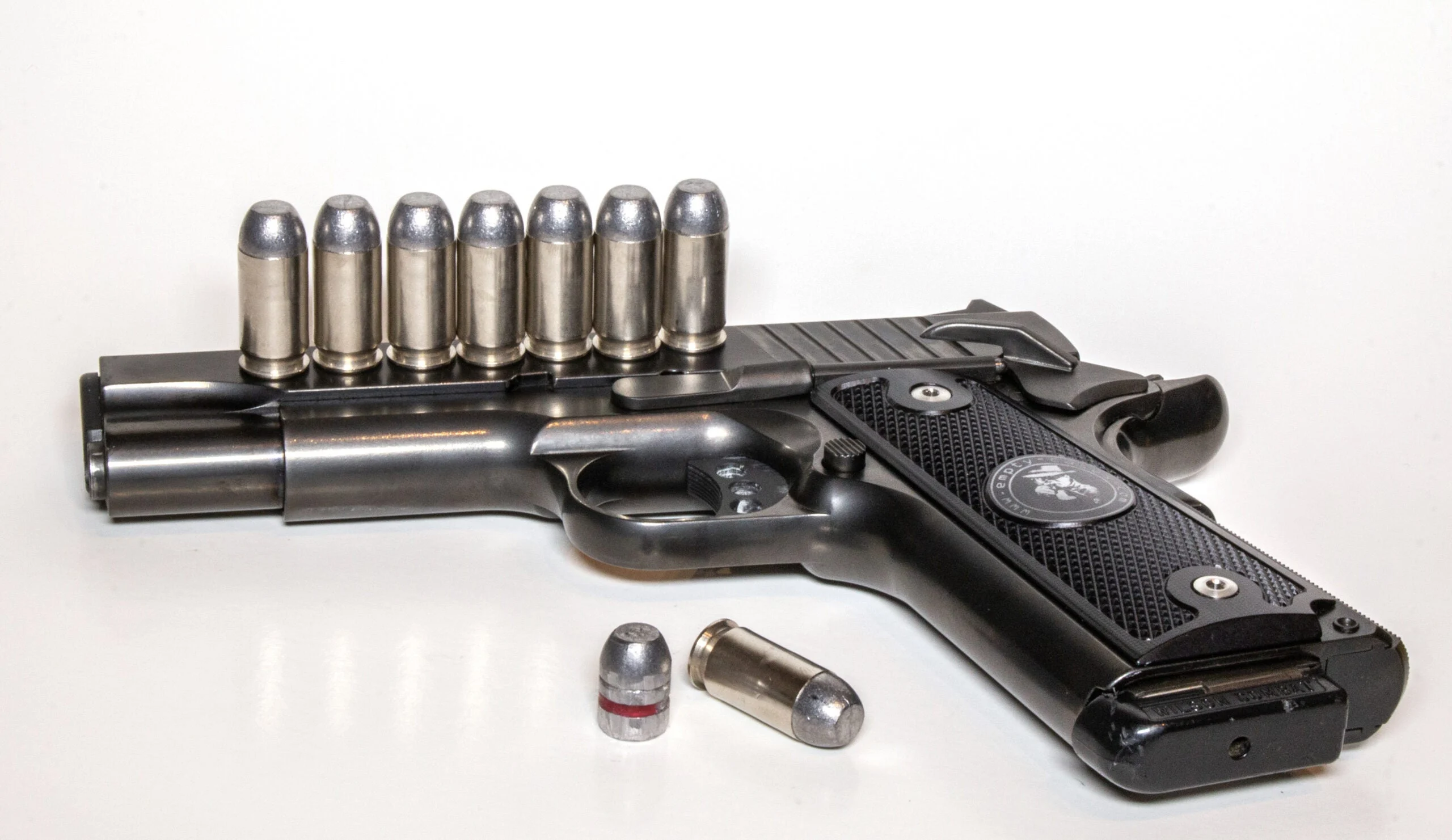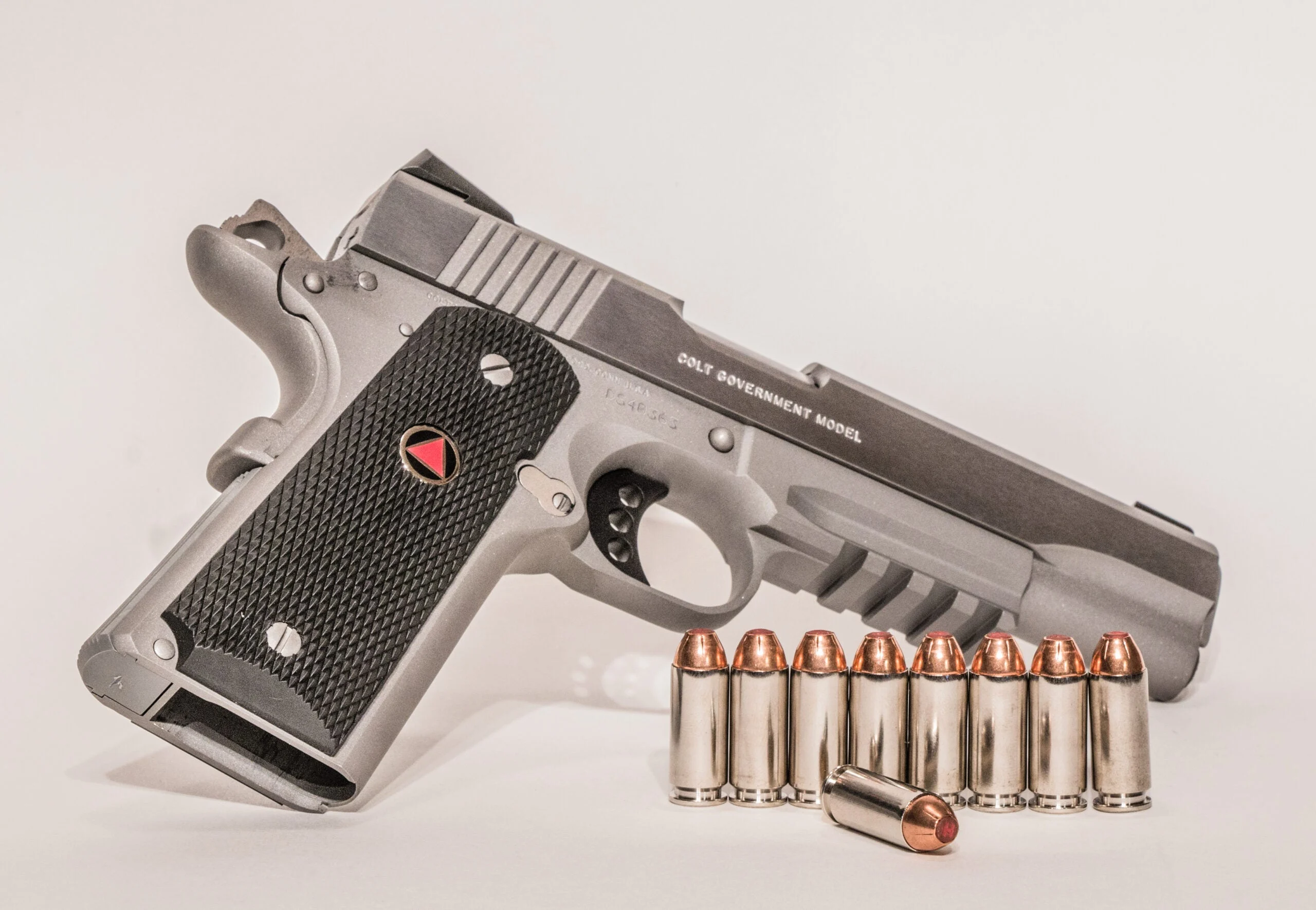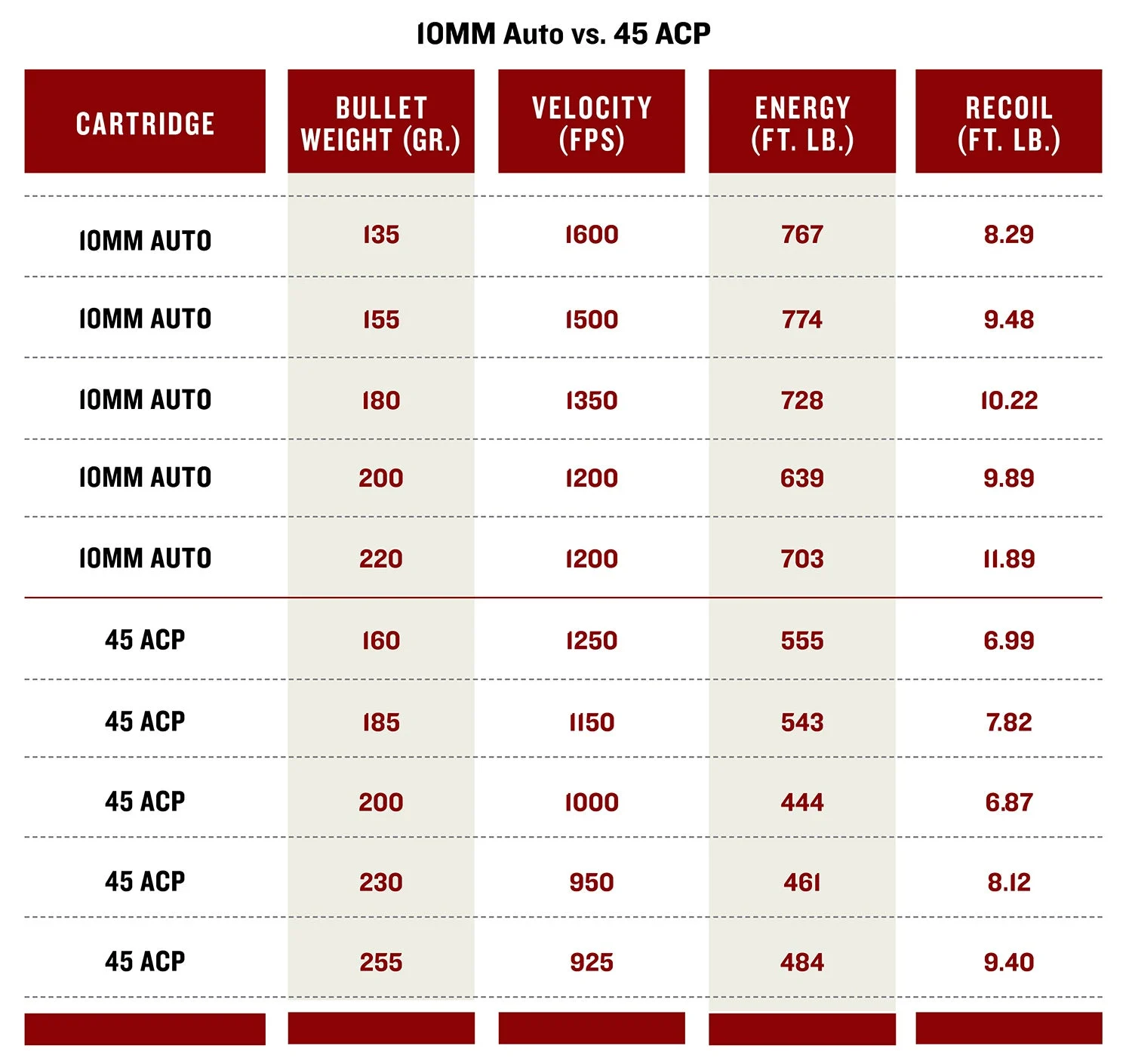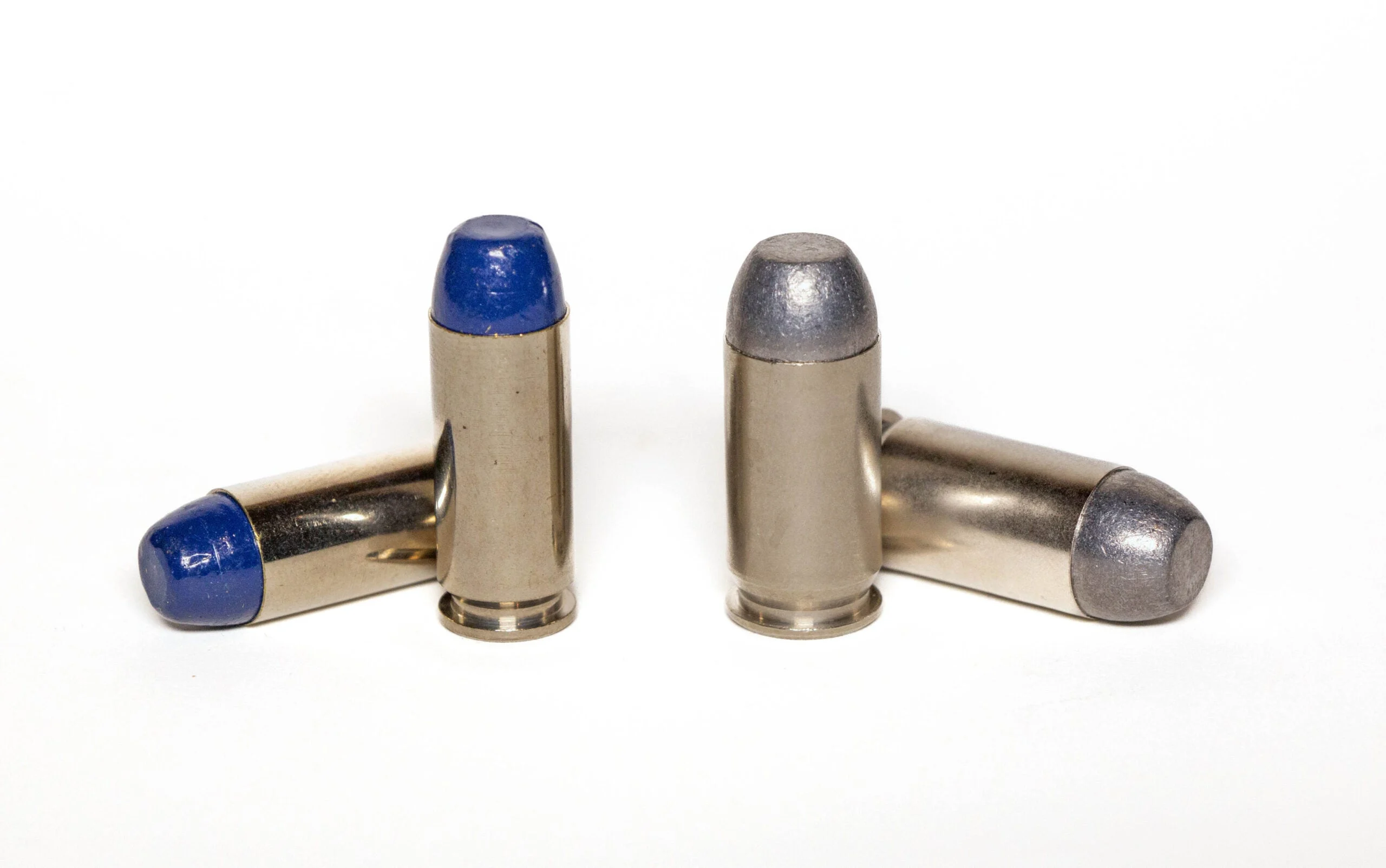_We may earn revenue from the products available on this page and participate in affiliate programs. Learn more ›
_
The 10mm vs 45 ACP debate has been raging for decades. For about 70 years, the 45 ACP, also known as the .45 Auto, was the undisputed king of the hill among semi-auto pistol cartridges. However, for the last 40 years or so, most shooters have come to believe that the 10mm Auto deserves that distinction. Sure, you can find 357 and 44 Magnum auto-pistols, but these are unwieldy contraptions with limited practical applications. Both the 10mm and the 45 are popular in the 1911 pistol, as well as other great models
; both are highly useful cartridges for a variety of purposes; and both have fascinating origins. So let’s take a close look at 10mm vs 45 ACP, and drill down on which is best suited for you needs.
The 45 ACP

Backwoods defense hard cast loads, like those from Buffalo Bore, are availed for the 45 Auto. These non-deforming bullets can drive as deep as three feet. Richard Mann
We’ll start with the 45 ACP because it was first on the scene. One of the most iconic of all pistol cartridges, the 45 Auto was designed by John Browning in 1904 and won its fame in the Colt 1911 pistol, which served the United States military until the 9mm Beretta was adopted in 1984. However, the 45 ACP remained in service long after that with some military organizations not overly enthralled with the 9mm. The 45 Auto is generally loaded with bullets ranging in weight from about 165 to 255 grains. It’s respected for packing a good punch without a lot of recoil, and it’s revered by many. The large diameter of the 45 Auto cartridge, however, limits capacity in pistols with common-sized grips designed to be manageable by the most shooters. Though the 45 has seen some use by law enforcement, most of its admiration has come from the military and civilian shooters.
The 10mm Automatic

The Colt Delta Elite helped make the 10mm Auto popular. Richard Mann
Some give credit to former Marine and Gunsite Academy founder Jeff Cooper for the development of the 10mm Automatic. The truth is, Cooper is mostly responsible for promoting the notion that a 200-grain 0.40-caliber bullet at 1000 fps would be a better option for personal protection – especially at distance – than the 45 Auto. Cooper consulted on the development of the 10mm, but the end result, which was first offered by Norma in 1983, was a bit more powerful. The 10mm Auto began to gain popularity in 1987 with Colt’s 1911 Delta Elite pistol, but it really took off because of its use in the Miami Vice television series and when the FBI selected it for duty in 1989. The FBI ultimately settled on the 40 S&W, often called the 10mm short, and have now reverted to the 9mm. For about two decades, the 10mm had what might be considered a cult-like following, but in the last 10 years interest has dramatically spiked, partially from increased interest in the round for handgun hunting and more ammo options.
10mm vs 45 ACP: Ballistic Comparison
A lot of factors contribute to ballistic performance, but one of the most important is pressure. Original 45 Auto ammunition was loaded to an average pressure of 21,000 psi. Amped up 45 Auto +P ammunition is loaded to 23,000 psi. The 10mm Auto, on the other hand, is loaded to a maximum average pressure of 37,500 psi. That’s substantially more power/pressure and is the reason a 200-grain bullet from a 10mm Auto has about a 20 percent velocity advantage over the same weight bullet from a 45 ACP. Here’s a breakdown.

Field & Stream
More velocity also equates to more kinetic energy. Now, kinetic energy alone is not a valid representation of terminal performance, but it does offer a comparison of power, or you might say, the ability of the bullet to do work after impact. When you compare the fastest 200-grain bullets from the 10mm and the 45 ACP, you’ll see that the 10mm bullet will have an energy advantage of about 195 foot-pounds (44 percent) at the muzzle. This seems substantial but remember, from a terminal-performance standpoint, bullet diameter matters too, and the 45 Auto has about a 12 percent advantage there, and generally even more with bullets that have fully deformed after impact. It’s pretty clear that the 10mm Auto is the ballistically superior cartridge, but ballistic superiority is not always the most important thing. Recoil matters too.
10mm vs 45 ACP: Recoil
My testing has shown that a 20 percent increase in recoil impulse will generally increase the time it takes you to fire two accurate shots—as fast as you can—by about the same percentage. This can matter a great deal or not at all. If you’re in an action-pistol competition, the harder kicking handgun will limit your ability to deliver fast and accurate shots. This is one reason few shooters compete with 10mm pistols. On the other hand, if you’re deer hunting, that first, single shot is really the one that matters.
Which is Better: Application Is the Key

The 10mm Auto (left) is more powerful than the 45 ACP (right), but that does not mean it is always the better cartridge for you purposes. Richard Mann
History, ballistics, and recoil aside, it’s what you want to do with a handgun that really determines which cartridge is best. If you want to shoot recreationally, the 45 ACP is more comfortable to shoot and ammo is more affordable too. If you want to hunt big-game, on the other hand, the 10mm hits harder and shoots flatter. If general-purpose self-defense is your primary concern, there are more 45 Auto ammo options, and its lighter recoil will allow you to shoot multiple shots faster.
The situation where the 10mm Auto has the bigges advantage is for backcountry survival or bear defense. Loaded with something like Buffalo Bore’s 220-grain hardcast Outdoorsman
load at 1200 fps, it will hit harder than any 45 ACP load, and because of the smaller diameter non-deforming bullet, will penetrate deeper, even deeper than a 180-grain Barnes Triple Shock bullet fired out of a 30-06 rifle!
**Read Next: Best Handguns of 2023, Tested and Reviewed
**






